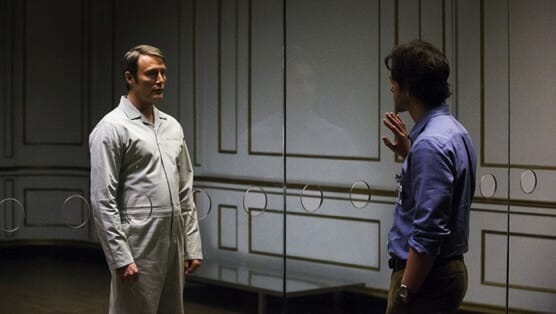Hannibal Finale: “The Wrath of the Lamb”
(Episode 3.13)

So there was once this television program…
It was a concept concocted in the mind of a visionary, if idiosyncratic writer and brought to vivid life by a filmmaker primarily known for his feature work. The series would incorporate no shortage of heightened, meticulously constructed dialogue and dozens of colorful, rich characters, but its primary thematic focus would center on two men—one, an authority figure being pulled between conflicting loyalties and the other a monstrous, imposing figure who nevertheless surpassed his moral shortcomings due in no small part to his immense charisma.
This series would last for three eventful seasons and, while cracks would start to show in its final year, it would be embraced by critics as well as certain niche groups of TV watchers. It would then be abruptly canceled, with promises of a renewal ever-present but never tangible.
I, of course, am referring to Deadwood, my favorite TV show of all time—the visionary in question being creator David Milch, the filmmaker Walter Hill and the dueling characters Timothy Olyphant’s Seth Bullock and Ian McShane’s Al Swearengen. Needless to say, between Bryan Fuller, David Slade and the Will Graham/Hannibal Lecter characters, the same could very well apply to Hannibal.
Over the past few weeks leading up to the Hannibal finale, I’ve thought a lot about Deadwood and how my relationship to it might inform my intense love for Hannibal. Obviously, my own personal history with the Thomas Harris books and film adaptations is one layer, but I think it’s something deeper than that. Indeed, despite their vast differences in theme and execution, there’s a kinship between the sensibilities of these two shows that hit me in a particular way. What that is, I can’t exactly put my finger on, but it’s something I’ll no doubt be mulling over in the weeks to come.
Likewise, I feared that the premature conclusion to Hannibal would, like Deadwood, end the story with a proverbial question mark, thus leaving fans wondering what could have been. And though there are some elements of that, “The Wrath of the Lamb” is about as perfect a conclusion to Bryan Fuller’s Hannibal saga as one could hope for. As a series finale, it works as an organic end to this sprawling, blood-soaked affair that spanned continents, years and various psychological mind palaces. At the same time, it also leaves a fair amount of space where the story could, if pressed, continue into future chapters.
The episode’s opening concludes the Dolarhyde/Reba confrontation from last week. As a terrified Reba attempts to reason with her boyfriend, Dolarhyde orders her to take a key from around his neck and lock the front door. Reba tries to make an escape, but Dolarhyde is prepared to catch her as she flees. He returns her to the house where he puts a shotgun to her face.
“I wish I could have trusted you,” he bemoans. “I wanted to trust you.” This is a bit of an odd phrase to lift from the books considering—in that context—Dolarhyde believed Reba had cheated on him. Here it’s because…she tried to escape after he informed her that he was a serial killer? Doesn’t really have the same heft.
But I digress. After setting the house on fire, Dolarhyde claims he can’t stand to watch Reba burn and blows his brains out. Reba, ever the resourceful gal, finds the key around his neck and makes her escape. Later, as she’s being questioned by Will in a hospital, Reba wonders aloud what it was about her that attracted a psychotic killer. “You didn’t draw a freak,” Will assures her. “You drew a man with a freak on his back.” Though Will is attempting to assuage Reba, he might as well be talking about himself and his own warped connection to Hannibal. With the Red Dragon presumably taken care of, Will returns to Hannibal and makes yet another attempt to end their relationship. “Was it good to see me?” Hannibal inquires, to which Will offers up a less-than-convincing, “No.”
But, of course, this story is far from over. Those familiar with the book will probably recognize Dolarhyde’s big deception. On a side note, as tonally out-of-step as it may be with the rest of the finale, I adored the scene between Price and Zeller, where they gleefully deconstruct how he managed to fake his own death. It’s a nice, winking nod to one of the more popular criticisms of the book concerning the absurdity of this fake-out. In any case, Dolarhyde reappears to Will and informs him that he wishes to kill Hannibal, who he perceives as having betrayed him.
It’s here that the episode transitions into a sort of bizarro version of Ocean’s Eleven, with Will devising a plan to bait Dolarhyde by faking Hannibal’s escape and having the doctor arrange a rendezvous. Hannibal is amused to no end that, after literally just cutting ties with him earlier, his “cunning boy” has returned for help. “I believe that’s what they call a mic drop,” Hannibal says, referring to Will’s previous dismissal of him. “But here you are having to come back to pick it up again.” Remember mic drop…that’ll be important later.
-

-

-

-

-

-

-

-

-

-

-

-

-

-

-

-

-

-

-

-

-

-

-

-

-

-

-

-

-

-

-

-

-

-

-

-

-

-

-

-








































